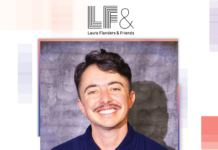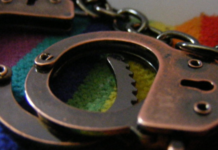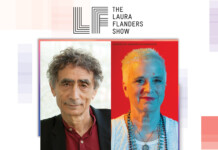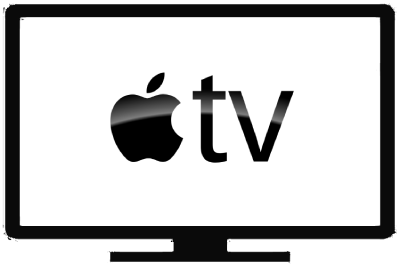You’ve seen them in protests since the start of the Israel/Hamas war — from New York City’s Grand Central Station and the Statue of Liberty, to the Capitol in DC, the highways of Durham, North Carolina, the Rose Bowl in Pasadena, Los Angeles, Philadelphia, and more. Who are the people of Jewish Voice for Peace (JVP), the largest progressive Jewish-led pro-Palestinian and anti-Zionist organization in the world? The Grand Central Station sit-in made history as the largest act of civil disobedience in New York City since the Iraq War. In this episode, Laura Flanders talks with two JVP members, Rosalind Petchesky, veteran political scientist and a leading theorist on international reproductive rights and Jay Saper, an artist and Yiddish translator, about their heroes and their inspirations — including Israeli peace activists and the families of Israeli hostages; and we meet New York State Assemblymember Zohran K. Mamdani, a Muslim, a Democratic Socialist and the first South Asian man in the NYS Assembly. Long before October 7, 2023, Mamdani, who represents Astoria, Queens introduced the Not On Our Dime! Bill that would make it illegal for New York State-registered charities to fund Israeli settler organizations. As you’ll hear, these guests see connections between white supremacy, Zionism, antisemitism, anti-Black racism, militarism and violence against women. What are the tools for building freedom and equity that connect us rather than divide us? Plus a commentary from Laura on news and no-news on Gaza.
“I moved to Cape Town in South Africa. I lived there until I was seven . . . and it was right after the fall of apartheid. And I always remember the words of Nelson Mandela saying that we know all too well that our freedom is incomplete without the freedom of Palestinians.” – Zohran K. Mamdani
“ synagogue in Jackson, Mississippi was bombed during the Jim Crow era because of her rabbi’s commitment to support the Black freedom struggle . . . makes it clear that antisemitism needs to be confronted by challenging all forms of white supremacy by speaking out against Islamophobia, by taking action against anti-Black racism, and by committing to a world where we build safety through solidarity.” – Jay Saper
“. . . When I went to Israel at the age of 16, I witnessed racism. I was so angry and so disillusioned that I turned away from Judaism for many years. Only now through JVP, through the young people of Jewish Voice for Peace, I’m rediscovering my connection and my identity as Jewish.” – Rosalind Petchesky
THE LAURA FLANDERS SHOW
Organizing for Ceasefire Through Policy & Protest: Meet the People of JVP & NY Assemblymember Mamdani
LAURA FLANDERS: You’ve probably seen them in protests since the start of the Israel-Hamas War out there in their black shirts with white writing in Grand Central Station, or at the Statue of Liberty in New York, at the Capitol in Washington, D.C., on the highways of Durham, North Carolina, or even at the Rose Bowl in Pasadena. You’ve probably seen them in protest, but have you asked yourself who the people are behind Jewish Voice for Peace or JVP, the largest, progressive, Jewish-led pro-Palestinian and anti-Zionist organization in the world. The Grand Central Station sit-in made history as the largest act of civil disobedience in New York City since the Iraq war. What attracted so many Jewish identified Americans of so many generations to that action and these others besides? Not so long ago in the studios of CUNY TV, I had a chance to talk with two JVP members, Ros Petchesky, Rosalind, professor, veteran, political scientist, and leading theorist on international reproductive rights and justice. And Jay Saper, an artist and Yiddish translator about their motivations for taking action today. And we were joined in that conversation by a assembly member, New York Assembly Member Zohran Mamdani, a Muslim, a Democratic Socialist, and the first South Asian man in the New York State Assembly. Long before October 7th, Mamdani who represents the Astoria Queens part of New York, introduced the Not On Our Dime Bill that would make it illegal for New York State registered charities to fund organizations that support Israeli settlements. The problems at the root of the death and dying today go back decades my guests, say, even generations. Can policy like this and protests like these work together to bring about ceasefire first and an equitable future going forward for all? We dug into that in our conversation and I ponder it a bit in my closing remarks, which you’ll find at the end of the show. But I began by asking my guests to tell us a little bit about themselves. If there was one thing you thought was important for people to know about you, what would it be?
JAY SAPER: My aunt grew up in Jackson, Mississippi. Her synagogue was bombed during the Jim Crow era because of her rabbi’s commitment to support the Black freedom struggle. And she continued to stand up to support racial justice in face of great violence. And I learned from her that my Jewish identity means taking action to bring about a better world. It means carrying forward a commitment to justice.
LAURA FLANDERS: And what about you, Ros? So much one could say.
ROSALIND PETCHESKY: Oh my gosh, especially if you’re 81 and you’re older than the state of Israel. You know, I grew up in a very observant Jewish family in Oklahoma, and I was a teenager during the Civil Rights Movement, and I became very involved with the Civil Rights Movement. And when I went to Israel at the age of 16, I witnessed racism. And I was so angry and so disillusioned that I turned away from Judaism for many years, many years. And only now through JVP, through the young people of Jewish Voice for Peace, I’m rediscovering my connection and my identity as Jewish. I wouldn’t have embraced it as much.
LAURA FLANDERS: And Zohran, your story is very different.
ZOHRAN K. MAMDANI: At the age of five, I moved to Cape Town in South Africa. I lived there until I was seven before we moved to New York City. And it was right after the fall of apartheid. And I always remember the words of Nelson Mandela saying, “That we know all too well that our freedom is incomplete without the freedom of Palestinians.”
LAURA FLANDERS: And I should say you’re a Muslim.
ZOHRAN K. MAMDANI: Yes, I am.
LAURA FLANDERS: How have you connected with JVP?
ZOHRAN K. MAMDANI: It is a beautiful illustration of how Judaism and Zionism are not the same thing. One is a religion, the other is a political movement. One has lasted for far longer than the other, and yet we are told time and again these lies as an attempt to justify and shield the state of Israel from any kind of critique. What JVP does, what IfNotNow does, what so many Jewish leftists do in this country and across the world is to make the truth known.
LAURA FLANDERS: Ros, if you were to say what’s the goal of what you are all engaged in?
ROSALIND PETCHESKY: I mean certainly liberation of Palestine, but beyond that, the goal is a world in which justice matters not just for us, but for all people.
LAURA FLANDERS: When you say liberation for Palestine, what does that mean for you, Jay?
JAY SAPER: We need to stop the bombing. We need to stop billions of dollars flowing to the Israeli military from the US government and support the people of Palestine in living with the full freedom and dignity that they deserve.
LAURA FLANDERS: You have been involved in legislation to address some of this going back again before October 7th. Can you tell us about the Not On Our Dime Bill and where it came from?
ZOHRAN K. MAMDANI: You know, the legislation would make it illegal for New York State registered charities to fund Israeli settler organizations. And this isn’t legislation that quite frankly should not be needed because Israeli settlements are illegal under international law. A settlement is an illegal outpost beyond the internationally recognized borders of Israel. And it is the annexation of land from Palestinians, something that now there are more than 750,000 settlers, so many settlements such that there is not actually a single contiguous piece of land that could function as the second state in a two-state solution. And so, this legislation was introduced, I introduced it myself in the assembly state, Senator Jabari Brisport introduced it in the Senate and we introduced it because a number of organizers and organizations such as Jewish Voice for Peace, such as the Adalah Justice Project, the US Campaign for Palestinian Rights, and so many others, informed us of the fact that in New York state, there is more than $60 million a year that is sent from our state tax-deductible to Israeli settler organizations. And those organizations use that money to facilitate the harassment, displacement, and murder of Palestinians.
LAURA FLANDERS: Is there a place for non-Jewish people in JVP?
JAY SAPER: Absolutely. While we’re inspired by Jewish tradition, we always welcome everyone who’s committed to the principles that Zohran has described of taking action for justice to join us. And we’re also so grateful to get to partner with so many other organizations who are taking action as well that were mentioned.
LAURA FLANDERS: And what do you say to people that say you sort of are acting as if you’re speaking for all Jews, but you’re really not and maybe are even increasing antisemitism?
ROSALIND PETCHESKY: Isn’t that what Israel does?
JAY SAPER: We are so deeply proud of our Jewish identity, deeply rooted in our Jewish identity. Before we shut down Grand Central Terminal, we staged one of the largest sit-ins ever at Congress. Rabbis were leading the program, leading us in songs, and leading us in chants rooted in our ritual in saying that our tradition inspires us to take action for justice. So we love our Jewish identity and we are deeply committed to ending antisemitism. Last summer, a 19-year-old Nazi was indicted for planning to carry out a mass shooting at my home synagogue, Congregation Shaarey Zedek in East Lansing, Michigan, where I had my B-mitzvah, where my grandparents had their funerals, where I still attend when I visit my family who still live there. He was planning that mass shooting on the fifth anniversary of the Christchurch massacre at the mosques in New Zealand, and had also praised the shooter of the Black grocery shoppers in Buffalo. Antisemitism needs to be confronted by challenging all forms of white supremacy, by speaking out against Islamophobia, by taking action against anti-Black racism, committing to a world where we build safety through solidarity.
ROSALIND PETCHESKY: The question of safety through solidarity, the question of linking antisemitism to white supremacy of all kinds, and that includes Islamophobia, that includes anti-Arab racism. If we don’t do that, we’re all dead. It’s not just safety, it’s survival. And actually, I mean, just think about that march. You know, “Jews will not replace us” in Charlottesville, Virginia. The right wing and the homegrown Nazis have made it very clear we are all their enemies and the ones they want to stamp out.
LAURA FLANDERS: There’s a gender aspect, of course, to white supremacy too and you’ve talked about feminism being at the heart of what you do, as always as an academic, as an activist, but also in this moment, the feminist analysis being brought to bear is important to you. We talked about Vivian Silver, Women for Peace.
ROSALIND PETCHESKY: Vivian Silver was amazing.
LAURA FLANDERS: Israeli activist.
ROSALIND PETCHESKY: She’s an icon for me too. She actually helped ferry Palestinian children from Gaza to hospitals in Israel. She worked with Gazans. She was across broader social justice activist. It’s horrible that she was killed and we don’t know for sure whose bombs killed her.
LAURA FLANDERS: And so, where do you see feminism in this moment?
ROSALIND PETCHESKY: First of all, to me, genocide is a form of reproductive injustice. It means the extirpation, the annihilation of a whole people’s ability to reproduce. And I think we should think of genocide that way. We should also understand that Israeli oppression of Palestinians has involved every level of population control. From Ben-Gurion on, the idea of a demographic war was central to Zionism. It meant we need to reproduce more than they do. It meant cutting off the ability of pregnant women to get to hospitals. Keeping them at checkpoints. It meant ignoring their reproductive health. It meant, well, shutting up so many men in prison, women too, that they could not be free to have families. I see Zionism, Israeli persecution of Palestinians as an enormous form of reproductive injustice and attack on families.
LAURA FLANDERS: So while we’re talking about supremacist thinking and racism, and sexism, I want to come back to you assemblyman, speaking as a Muslim, what have you seen in the contrast between the way that some of the pro-Palestinian, Muslim-led demonstrations have been policed versus some of the JVP protests?
ZOHRAN K. MAMDANI: We have seen the police attack a number of demonstrators at a number of Muslim-led protests around the city. And there is a consistent rhetoric of demonization coming from politicians at every level of government in characterizing those who take to the streets for freedom as worthy of receiving violence from the state. And it is immensely concerning, especially as one of the few Muslim-elected officials in this state, someone who represents Steinway Street in Astoria, which is where Mayor Bloomberg’s demographics unit was at its peak. This was a unit within the NYPD that Mayor Bloomberg created to surveil Muslims illegally.
LAURA FLANDERS: After 9/11.
ZOHRAN K. MAMDANI: Yes and these were officers who would spend time in barbershops, in cafes, in travel agencies. They would go to Astoria Park and write down how often Muslims played soccer. We know what the post-9/11 surveillance apparatus looked like and we are living through an echo of it in this moment where police are using drones to capture as many identities as possible of those who are taking part in these protests.
LAURA FLANDERS: There’s a war outside and there’s a very large change that you are calling for. You’re calling for a new lens to be applied to what is happening in Israel-Palestine. You’re calling for a rhetorical shift. In some ways you’re affecting a rhetorical shift and I’d like you to talk about that, but speak to the audience that feels this is your struggle. Perhaps it’s not theirs. Where do you see this going? Who do you need to join you? Who are your biggest obstacles perhaps? Who do you want to address, Ros?
ROSALIND PETCHESKY: The militarists. Going back to feminism, there’s a reason why so many women’s groups around the world, Women In Black, Women for Peace and Freedom, women’s groups have always said strongly, war is never an answer. War will only lead to more war and more violence. Rape is an intrinsic part of war. Women suffer sexual violence and so do men thinking of Abu Ghraib. Sexual violence, rape is an intrinsic part of war, I would say to people in this country, let’s just say the US, think about your tax money. Think about how much of your tax money is going to the weapons of war, to destroying other people. Is that what you want your tax money to do instead of, I mean, Martin Luther King said it during Vietnam. Like a vacuum sucking up all the resources for education and health, infrastructure. Stop war.
LAURA FLANDERS: Jay, is there someone you want to address here that isn’t part of your movement yet that you’d like to be or that you feel doesn’t understand what you’re doing?
JAY SAPER: Well, what we understand and what we know is so important to address is that the root of violence is oppression. And we have to understand that 75 years ago, 750,000 Palestinians were forcibly displaced from their homes during the Nakba. They’ve been subjected to an apartheid government ever since. And so, we know that we have to speak out, that we have to take action, that nobody can be free until Palestinians are free, until everybody is free, until we address the root causes of violence, until we address the 75 years of oppression.
LAURA FLANDERS: And coming back to you assemblyman, what’s your sense of your role as a politician, as an elected, and what would be your message perhaps to other electeds about what their role could be in this moment?
ZOHRAN K. MAMDANI: My role and the role of many politicians in this country is to make clear that your language and policy with regards to Palestinians and Israelis is inextricable from the realities faced by individuals across this country. When you have individuals such as President Joe Biden casting doubt on the truth of Palestinians, even in their death count, when there is a broad attempt at characterizing Palestinians as subhuman or as all members of a terrorist group that should be exterminated, you create the conditions that justify anti-Palestinian racism across this country. And you cannot then be surprised when you see 6-year-old Wadea be killed in Illinois when you see three Palestinian students be shot in Burlington with one of them being paralyzed for the rest of his life. These are the realities of what we think of as something far away. We cannot afford as Americans to think of this as a problem that is not ours unless personally connected to it. This is not a religious issue. This is an issue about power and oppression. There’s the power of the person, the power of the pulpit. You know, it is our job to humanize every single person. I serve in the state legislature, the governor, Governor Kathy Hochul, when asked what she would say to Palestinian Americans concerned for the safety of their loved ones in Gaza, the first words she had to say was, “I call on law abiding Palestinians to condemn Hamas.” What does that indicate of her views of the humanity of Palestinians if the first impulse is to use them as a political cudgel?
LAURA FLANDERS: Is there advice that you have for an effective kind of inside-outside strategy between activists and electeds from your point of view? Is it helpful when people show up at your office?
ZOHRAN K. MAMDANI: I think it’s immensely helpful. I would never have introduced legislation that I’m so proud to be associated with, were it not for the efforts of activists and organizations like JVP. And I think the truth of the matter is that we cannot look for a conscience in politics and politicians. We have to find it in mass movement organizations. And it is that conscience, that compass that keeps myself and so many others on the right path.
LAURA FLANDERS: I have just two last questions and one of them has to do with you, Ros. I mean, you mentioned in a speech not so long ago that you felt like you were a time traveler, and you described being part of sit-ins against the Vietnam War, and that reminded me of Columbia and that reminded me of sit-ins that I participated in against apartheid in South Africa. And I think it’s important that we end by saying that change is possible, that we’ve seen it in our lifetime. You’ve seen it in lots of places in your lifetime. Do you think you’ll see change here in your lifetime? I hope you live forever.
ROSALIND PETCHESKY: Yes. Well, thank you. I won’t, but I’ve seen lots and lots of change. Some good, some bad. But what encourages me now is that conversation about Palestine and talk about Palestine, and even the beginnings of the humanization that Zohran was talking about is really beginning. We really see much, much more awareness. There was never, people weren’t even talking about it. It wasn’t in the public arena as much as now and I think that opens the way.
LAURA FLANDERS: How would you imagine the story will be that the future tells of now? That’s a usual closing question. What do you think will be the story the future tells of this moment? Jay.
JAY SAPER: The politicians who have exacerbated and fueled the bombing of the Palestinian people of Gaza will not be forgotten. But also what will be remembered is everyday people around the world taking to the streets, raising our voices, refusing to accept what we are witnessing, a genocide unfold in real time, that people put their bodies on the line, took risks, that we did everything we could because we must do everything we can to try to stop the bombing of Gaza
LAURA FLANDERS: Assemblyman?
ZOHRAN K. MAMDANI: The amount of people I’ve seen on the streets, the fact that a call to value Palestinian lives and call for a ceasefire is the majority position in this country, is sadly a remarkable development in the history of this country’s relationship with Palestinians. And I think it speaks to the fact that there is a broad chasm between public sentiment and political convention. And I hope that this is the time that we look back as when we created the bridge between the two and we started to see that reflection in the chambers of power.
LAURA FLANDERS: Also, the Israeli dead in the Hamas attack have brought forth Israeli voices for peace and justice that I haven’t heard, at least in our US media.
ROSALIND PETCHESKY: What resonates with me is many young activists saying, “This is our anti-war movement. This is our anti-war movement.” And maybe what will happen in the future is people will remember Palestine and Palestinians as the ones who made possible a new vision of justice across all borders, and peace and humanity as something that we can actually concretely imagine.
ZOHRAN K. MAMDANI: And it is our job to ensure that Palestinians are alive to see that themselves.
ROSALIND PETCHESKY: Yes, absolutely.
LAURA FLANDERS: Ros Petchesky, Jay Saper, Assemblyman Mamdani, thank you so much all of you for being here. It’s been a pleasure to have you.
The Jews of JVP take personal responsibility for the actions of the Israeli state, in part because that state was founded ostensibly as a haven for Jews after centuries of antisemitism around the world and the Holocaust of World War II. It was supposed to be a Jewish state with safety for Jews and Jewish priorities paramount. But over 75 years, that experiment our guests say, has failed and that homeland has become homicidal. Protecting Jewish power and the structure of the state at any cost has meant that right now, for example, tens of thousands of Palestinian lives have been lost, but thousands of Israeli and foreign national ones besides. Real questions are being asked, for example, about the death of peace activist Vivian Silver. Did she die at the hand of her hostage makers or did she instead perish as a result of a deadly policy on the Israeli military side to punish the hostage takers at whatever cost, even at the cost of Israeli lives? Did she in fact die in heavy tank shelling of the place where she was being held? Those questions remain, but the protesters you see in the streets today are calling for more than ceasefire. They are calling for a reassessment of the way that power in Israel is held. Could we come to an agreement for mutual coexistence and self-respect, a kind of peace that might guarantee justice for all? It all seems far off, both in terms of time and place, but I ask you, has our homeland, too, ever been homicidal? What does our government, what do we allow to be done in the name of perpetuating power as it is, and resisting power shifts and change? And what kind of personal responsibility do we take for the actions of our state? If we want our homelands not to be homicidal, what might ‘different’ look like? We’re gonna continue to report on that question in the weeks and months to come, and I hope you’ll join me. If you want to find my full uncut conversation of today, you can through a subscription to our free podcast. In the meantime, stay kind, stay curious, and thanks for joining me. Till the next time, I’m Laura for the Laura Flanders show. For more on this episode and other forward-thinking content, subscribe to our free newsletter for updates, my commentaries, and our full uncut conversations. We also have a podcast. It’s all at LauraFlanders.org.
• “Questions to Ask Before Your Bat Mitzvah” by Morgan Bassichis, Jay Saper and Rachel Valinsky Get the Book
• “A Land with a People: Palestinians and Jews Confront Zionism” by Esther Farmer, Rosalind Petchesky and Sarah Sills: Get the Book
• “Abortion and Woman’s Choice: The State, Sexuality and Reproductive Freedom” by Rosalind Petchesky: Get the Book
• The Israeli settler movement expelling Palestinians from their generational homes is subsidized by New York State. End Funding of Israeli Settler Violence NotOnOurDime.comNot On Our Dime Legislation NYAssembly.gov
• New York Helps Subsidize Israeli Settler Groups—Zohran Mamdani Isn’t OK With That, by Mohammed El-Kurd, The Nation, August 9, 2023 Read Here
• New York law aims to stop funding of illegal Israeli settlements in West Bank, by Chris McGreal, The Guardian, May 17, 2023, Read Here
• Not in Their Name, Jewish Voice for Peace doesn’t just oppose the war; it challenges the link between Jewish identity and support for Israel, by Noah Hurowitz, New York Magazine, November 27, 2023, Read Here
“Dem Militarize Democracy” by Femi Kuti from his album One People One World released on Knitting Factory Records. Listen / Learn More
The Laura Flanders Show is committed to making our programming, website and social media as accessible as possible to everyone, including those with visual, hearing, cognitive and motor impairments. We’re constantly working towards improving the accessibility of our content to ensure we provide equal access to all. If you would like to request accessibility-related assistance, report any accessibility problems, or request any information in accessible alternative formats, please contact us.
















